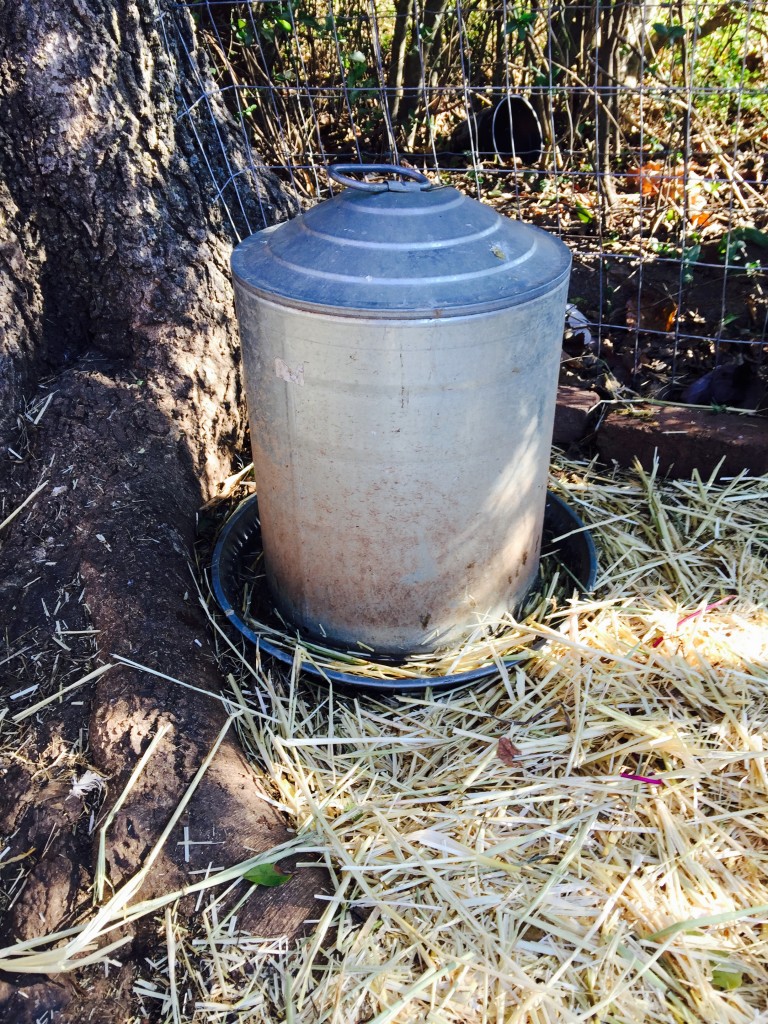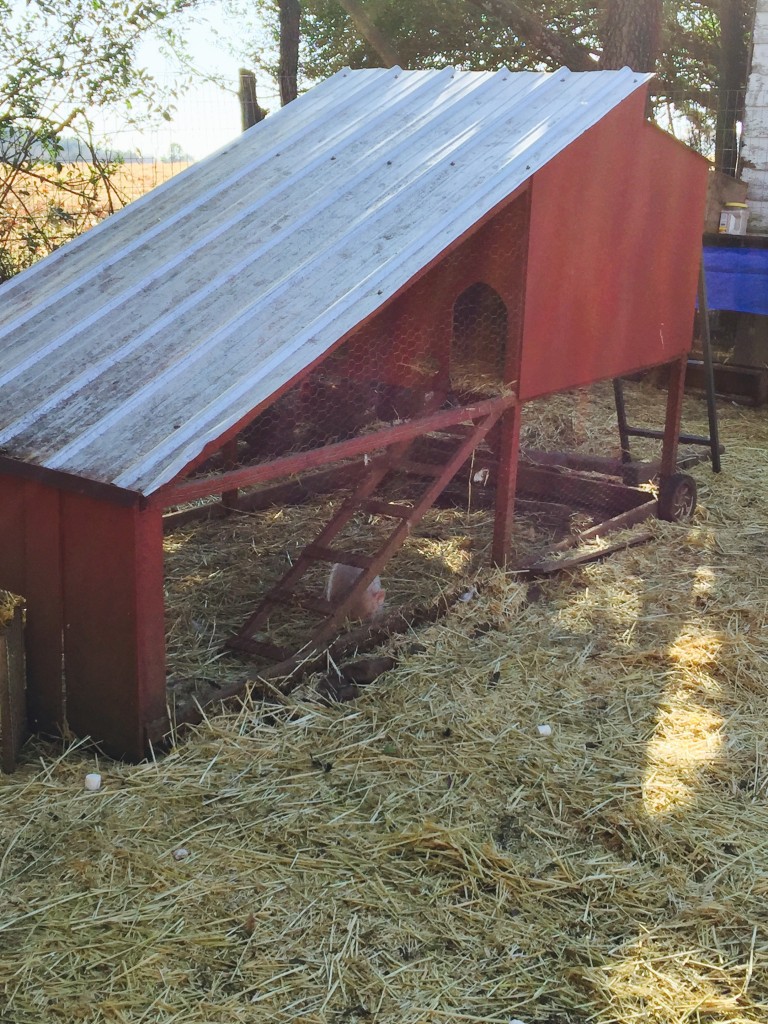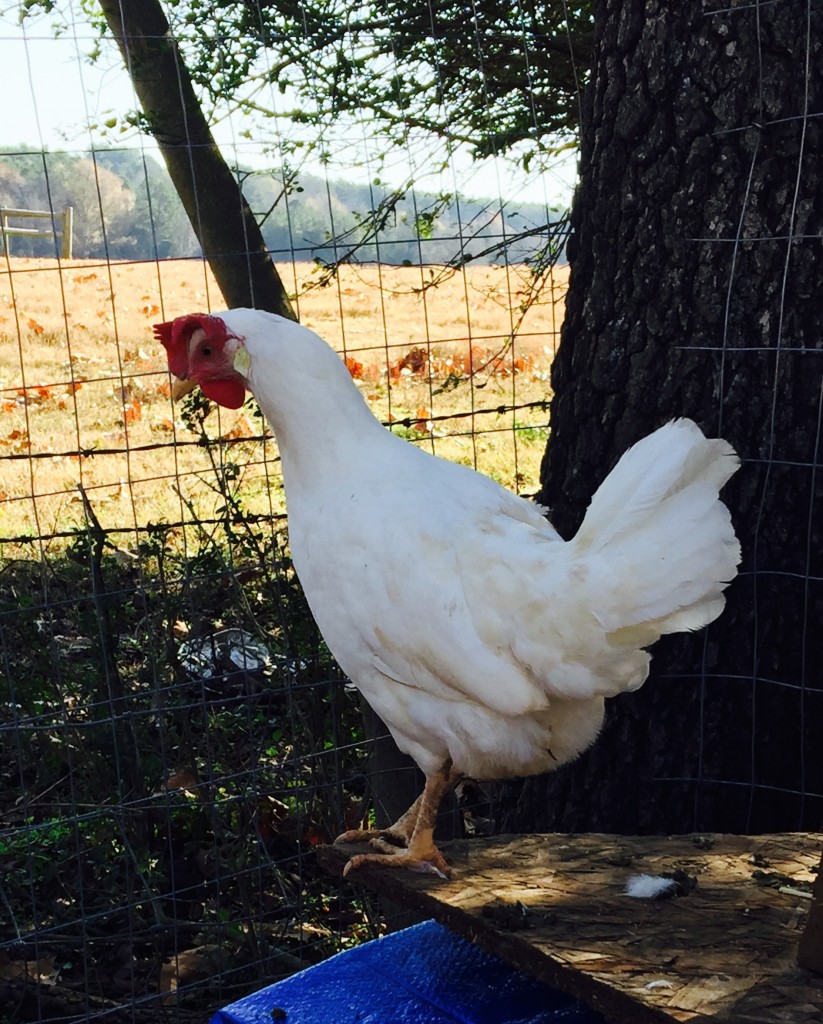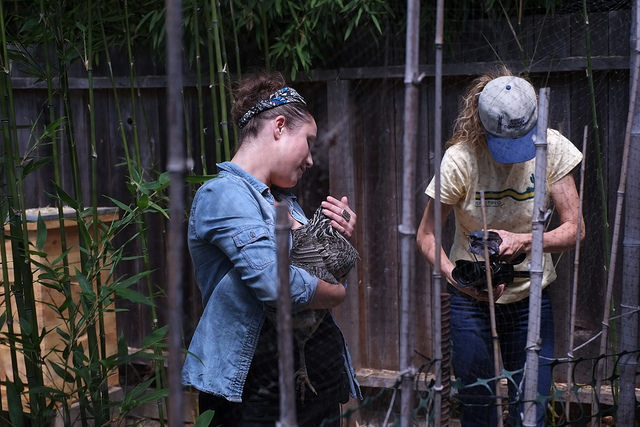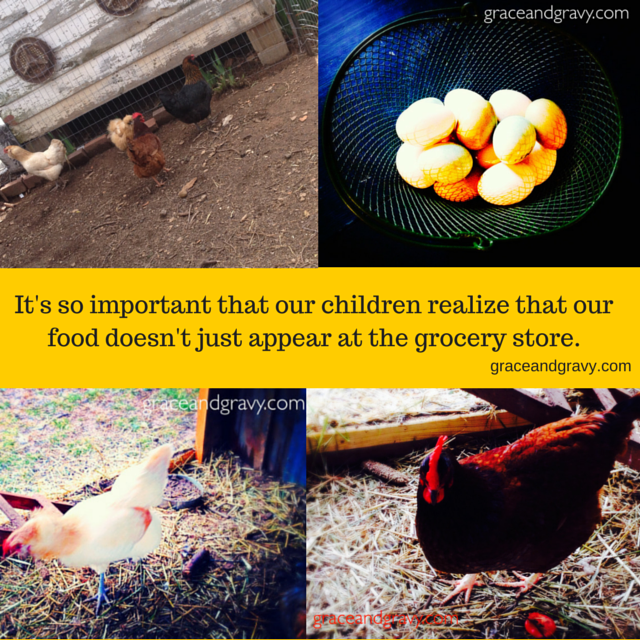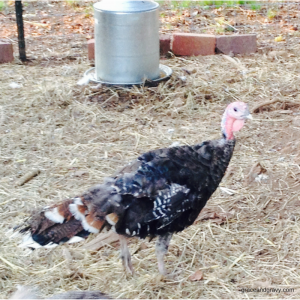The post Help Hens Lay More Eggs appeared first on GraceandGravy with a side of life!.viagra canada price appeared first on Erectile Dysfunction appeared first on
]]>Jordan Walker is very fond of animals. As the lead content curator for Coops and Cages and other animal-related blog sites, he has written several articles about them. In this post, he shares tips on how you can help your chickens produce more eggs.
It would really be frustrating to raise egg-laying chickens, and at the end of the day, you don’t even get at least one nutritious. So before you decide to go for roasted chicken as your second business option, there are actually some things you can do to help your hens lay more eggs and recoup the most from your investment.
Factors that Affect Production
Before we get to the different tips for better egg-laying, you need to understand there are several factors that affect your hens’ productivity. These include genetics, age, daylight hours, nutrition, and stress.
Genetics – Some hybrids are just great layers. These are the California White, Production Red, Production Grey, and others. As for heritage breeds, your best choice would be the Rhode Island Red or the White Leghorn.
Age – A hen is usually most productive between six and 18 months. At around one to two-years-old, the hen will go through molting, where it loses a lot of its feathers. And to grow new feathers, it will need more protein, which greatly affects her production. Thus, you have to expect very little numbers of eggs at that time. Once the hen is back in shape, she will start laying larger, but fewer eggs. And as she grows older, the number of eggs will again decrease.
Daylight Hours – Naturally, hens lay eggs during the summer and spring when days are longer. Their instincts say that these are the days to best raise their young. Nonetheless, you can still try to mimic the longer days on other seasons by setting up a timed light that turns on for 14 to 15 hours per day.
In addition, some breeds can produce well in cold seasons. So if you live in an area that has a generally cold climate, be mindful of the breed you choose. Also, make sure to collect eggs as often as possible because these might freeze and crack during winter.
Nutrition – Of course, your hens will not lay eggs if they are not healthy. Therefore, you need to feed them with the right food according to their life stage or age and make sure that the products you choose are of excellent quality.
Stress – Always keep in mind that happy hens lay more eggs. People tend to be less productive when they are under stress, unhappy, or depressed. Just like humans, hens will not be productive when they are always under stress. A concrete example of a stressful situation is when they are constantly being chased by your dog.
With all these factors in mind, we proceed with the tips that help your hens lay more eggs:
#1 – Quality Food
As a responsible poultry owner, it is your duty to give them the best you can afford. But this does not mean that you go all out and give them everything you can think of. As long as you make sure they are getting some quality feed and that they are fed on time, then it would be fine.
Good food is not only for vital to help them lay eggs. It also needed to keep them healthy and stress-free. When choosing a chicken feed, it should at least the essential elements, such as carbohydrates, protein, fat, vitamins and minerals. If in doubt, you can give them a premium laying pellet or mash, supplemented with occasional vegetables, fruits and other treats.
But, take note that treats should be minimized for laying hens because it makes them gain fat tissues in their abdomen. Aside from being unhealthy for the hens, these will also significantly lower the number of eggs they produce.
Furthermore, make sure that your hens are supplemented with calcium. Egg-laying chickens require a lot of calcium intake. So, aside from providing them with high-quality feeds, you might also want to give them crushed oyster shells.
If your hens are receiving quality feeds and are supplemented with calcium, yet still produce thin-shelled eggs or low in number, you can add vitamin D3 in their diet. This is great for better calcium absorption.
#2 – Fresh and Clean Water
Water is as essential as their food. Provide your hens with a constant supply of water because this helps them stay productive and healthy. Also, make sure you provide them with a fresh, clean water every now and then. Hens will not consume dirty water, and if they could not find a clean source, they will go thirsty and possibly become dehydrated.
#3 – Clean and Secure Coop
Build your hens a nice coop and make sure it stays clean and dry. Avoid the formation of mud in the pens by regularly eliminating litters in the coop and raking up droppings. By doing this, you will not just minimize the possibility of chickens bringing mud and feces into their coop or nest boxes, you will also keep the coop clean and prevent it from smelling bad. This will help keep the eggs clean as well.
Also, make sure that your chickens are not overcrowded by providing adequate nesting boxes at a ratio of at least one box to four chickens. Finally, keep the coops safe from other animals. If hens are constantly in fear, they will not be very productive.
#4 – Regular Inspections
Inspect your chickens regularly for possible health problems, because any condition can greatly affect their productivity. Check every body part as much as possible – wings, feet, bills, head, body, womb, etc. Always be very observant. If a chicken has acquired a fracture, an infected wood, or seems to lack energy, then visit your avian veterinarian immediately. When you do regular inspections, you can identify problems earlier and the proper treatment will be rendered as soon as possible.
Another thing to inspect is parasites. One of the major nuisances is the mites. If you see tiny, reddish-brown crawling insects in your chicken’s head or body, better treat them and their coops. Ivermectin is one of the common remedies for body mites, while the food-grade Diatomaceous Earth is used for the coops.
#5 – Stress-Free Living
When your hens are happy, their productivity will boost. There are several ways to a stress-free living for your chickens. As mentioned earlier, one way is to keep other animals from their pens or coops. Another is to let them roam in your yard. However, if you are concerned with safety, then you can build a secure pen where they can at least stay loose and “graze” on your yard. You may also let them loose just before dark, but be sure to let them in at night.
If you are having trouble with the number of eggs your hens are producing, don’t give up right away. Try the simple tips above. Hopefully, these will help you rip the fruits of your labor. Good luck!
The post Help Hens Lay More Eggs appeared first on GraceandGravy with a side of life!.viagra canada price appeared first on Erectile Dysfunction appeared first on
]]>The post Waffle Breakfast Casserole w/Sweet Maple Bacon Syrup Post for Petit Jean Meats appeared first on GraceandGravy with a side of life!.
]]>
I had the great honor of sharing another one of my creations with Petit Jean Meats using Petit Jean Hickory Smoked Bacon.
Waffle Breakfast Casserole w/Sweet Maple Bacon Syrup is a sweet, yet savory and is perfect for breakfast or brunch.
“I find that if I prepare food from my heart, that makes my family enjoy meal time together even more. That is why I put so much time and effort in creating the perfect creations for my family to enjoy.”
And could there be anything more mouth-watering than a mason jar of Homemade Sweet Maple Bacon Syrup? Who doesn’t love their bacon drenched in sweet maple syrup?
Hop on over to Petit Jean Meats and grab my recipe for Waffle Breakfast Casserole w/Sweet Maple Bacon Syrup
I hope you enjoy!
Waffle Breakfast Casserole w/Sweet Maple Bacon Syrup
The post Waffle Breakfast Casserole w/Sweet Maple Bacon Syrup Post for Petit Jean Meats appeared first on GraceandGravy with a side of life!.
]]>The post How to Raise Chickens in an Urban Setting appeared first on GraceandGravy with a side of life!.
]]>
In this modern day and age where everything almost seems to be instant and within your reach, it is best to know that you can save money and have food straight from your own backyard. The big question is, “How is this possible?”
You can raise your own backyard flock and get to keep chickens with you with comfort. You would actually be surprised to know that chickens can adapt well in an urban setting.
Hens are easy to grow and even inexpensive to maintain. Chickens will also provide you fresh and nutritious eggs. If you have weeds or bugs at home, you will no longer have to worry about getting rid of them as the chickens will do it for you. They even provide nitrogen-rich fertilizer, and serve as great pets.
On the other hand, you would probably worry about a lot of things when it comes to raising chickens in your backyard. There isn’t really that much to worry about when it comes to doing this. It is possible for you to raise chickens. But it would be wise to know the important basics first on how to do it.
Know the local laws and city ordinances. Check for local laws and regulations in your city. Know whether it is legal for you to own chickens in your location. Contact your local municipality, homeowners’ association, or the local animal control department just to check what the laws are in your place. Some cities limit the number of chickens you can raise in your own land. There are other areas; however, that wouldn’t require permits in growing chickens in one’s backyard especially if these areas have a strong farming culture.
Figure out what breed and how many chickens you should buy. Before buying chickens, you should know first the role of the chickens you want to breed. Do you want the meat-producing or the egg-producing type, or both? Discover first what you want to help you determine which kind of breed you should buy, or what kind of coop you will need.
Build or buy a sturdy coop. In case you don’t know yet what a coop is, it is a cage or a pen where you can confine the chickens. When it comes to preparing an outside chicken coop, you must consider some important factors. Number one is the chickens’ safety. Set a 4 sq. ft. space inside the coop per chicken and 10 sq. ft. for the outdoor space. There should be no cracks or loose space where other animals could get in. To secure the chickens better, surround the coop with a wire cage. Just check if there are protruding wires or nails from the coop. Make sure that the coop has good air flow in it too.
Every once in a week or two, clean out the whole coop. This way, you get to keep your chickens from being sick and getting parasites. If you find your place a safe area for the chickens to roam, let them do it freely during the day. Just make sure that you can watch them and that they don’t go off too far.
Build a nest box for the chickens to lay their eggs on. You should also pay attention to your chickens’ nesting boxes because these are the special areas your chickens will lay eggs. Eggs are a great source of protein and eggs can be made into any kind of dish. When building a nest box, it should be large enough to hold a hen (around 12 inches) and with a small lip at the end of it to stop the egg from rolling out. The nest may consist of straw, pine needles, or wood shavings. Keep the nest box dark, and have 4 of these for every six chickens. You can set up dropping boards to catch the chicken litter and turn them into garden compost later.
Provide the right feed. Look out for a nearby feed supply store and buy a bag ahead so you won’t have any trouble of running out of stock. You should give your chickens a good amount of protein and carbohydrates into their diet. Corn, barley, and wheat are good sources of protein for your chickens. They also need calcium so feed them egg shells. Avoid giving them onions, garlic, chocolate, raw potatoes, avocados, or any damp feed because these might poison them. Keep the insecticides and other chemicals out of the chickens’ reach.
Now that you know the basics in raising chickens in the city, it’s about time you consider doing it and start the work. Count your chickens and check if they are eating and drinking well, if their food are clean and fresh, if they are having trouble breathing, if they are losing feathers, or have any other signs of disease. If they are sick and left unsupervised, your chickens will die. Hence, you should also keep a first aid kit for your chickens. You may have them dewormed and vaccinated too.
There are so many ways of growing chicken breeds and taking care of them. All it takes is that you don’t chicken out and you do your plan well.
Image Sources: [1] [2] [3] [4] [5] [6] [7]
Author: Jordan Walker
Jordan is the lead content curator for Coops And Cages as well as a couple of other pet related blogs. His passion for animals is only matched by his love for ‘attempting’ to play the guitar. If you would like to catch him, you can via Google+ or Twitter: @CoopsAndCages
The post How to Raise Chickens in an Urban Setting appeared first on GraceandGravy with a side of life!.
]]>The post Wait…..I’m a Homesteader? appeared first on GraceandGravy with a side of life!.
]]>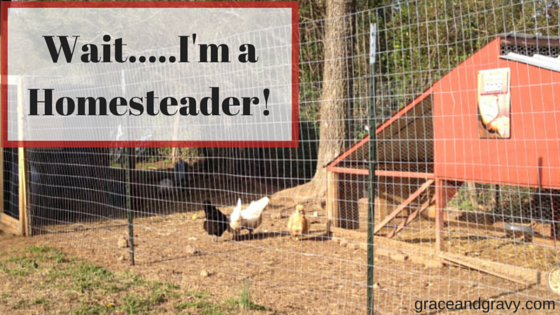
If you would have asked me a few years ago if I would ever consider myself a homesteader, my answer would have been, “What’s a Homesteader”! HaHa
Isn’t it amazing how our perspective for our lives change!
But even though I am living the life as a homesteader, I guess most of the time I just don’t think about it that way.
Now when people ask me how I feel about homesteading, my reaction is, “Wait……I’m a Homesteader?”!
I think there is so many mis-conceptions about homesteading.
People think if you are a homesteader you must live in a shack in the boonies, with no running water, no electricity and bare-foot and pregnant all your life!
When in reality, that couldn’t be further from the truth.
My family lives in a ranch style house, and even though we live in a rural area, we actually live right in town!
We have a store 3 blocks down the road, and a post office 4 blocks away.
Our local Police and Fire Dept is a 10 minute walk from my house.
So we have clarified that I do not live in the boonies, I do have running water and electricity, and even though I do run around barefooted, I haven’t been pregnant in fourteen years!
And even though I don’t like fixing my hair and putting on make-up everyday (hey my chickens don’t care what I look like!), I do enjoy getting dressed up and going out. I don’t sew my own clothes, even though I would if I could, my husband can’t live without his Hollister Clothes and hairspray, but we try to always buy them second hand!
We define Homesteading as this: Living a self-sufficient life (meaning not relying on others to provide our needs).
Be satisfied with what we have, and taking value in learning to grow, raise and make our own food, and other necessities. It’s so important that our children realize that our food doesn’t just appear at the grocery store.
And most important for me is, not being wasteful. Trying to preserve what you have.
Some ways I define myself as a homesteader is, I enjoy raising chickens. I love going out in the morning and gathering eggs. It brings me such a sense of simplicity.
We also raise meat rabbits and turkeys. You might say, don’t you feel bad? Yes sometimes I do, but my son is the one who raises the rabbits and if he didn’t he would just take his gun up the road and come home with a couple he shot anyway.
I make my own laundry and bar soap. I do enjoy girly smells, but my skin is very sensitive and it cannot always handle what is added to soaps. Making it myself guarantees I know exactly what I is added.
I love the smell of line-dried laundry. It makes me think of my momma and growing up! Sometimes it’s the little things that make you a homesteader.
We try to buy most of our clothing, decor and furniture second-hand or at least on clearance. I’m not one for wasting money on things that I can get at a discounted price! That money can buy more chickens!
I also like growing our own fruits and vegetables when I can. And I love to can my own jellies, syrups, pickles and more.
Being a homesteader doesn’t make me different, it just makes me more aware of how I live!
And of course everyone has to have a Homestead Hound, Right?
I believe the definition for a homesteader is different for everybody.
Don’t think your a homesteader?
Take a look around your life and home. You might be surprised!
The post Wait…..I’m a Homesteader? appeared first on GraceandGravy with a side of life!.
]]>



